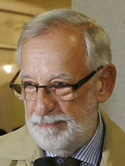
The Interviewees
Herve Georgelin | Pelin Böke | Alex Baltazzi | Axel Corlu | Philip Mansel | Antony Wynn | Fortunato Maresia | Vjeran Kursar | Christine Lindner | Frank Castiglione | Clifford Endres | Zeynep Cebeci Suvari | Sadık Uşaklıgil | İlhan Pınar | Ümit Eser | Bugra Poyraz | Oğuz Aydemir

Interview with Fortunato Maresia post publication of his book ‘Pera, Beyoğlu ve Anılar’ [Pera, Beyoğlu and Memories], March 2015
1- You wrote the book on Pera, Beyoglu and Memories for your daughter who lives abroad so she has a sense of the city and quarter that you have lived all your life. Yet after the initial Italian publication you published a slightly expanded Turkish edition, so what was the motive for this second edition?
There is no specific reason. The first edition was in fact a compilation of a series of articles that I had written for “la Gazetta d’Istanbul”, a monthly magazine published by Circolo Roma, a club for Italians and their friends in Istanbul. Many of these people asked me to publish, and I compiled a bit hastily in order to be able to present it at the fair of Portobello organised by the afore mentioned club for needy people. Besides the proceeds from the sales of the book goes entirely to charitable organisations. Afterwards I realised that there were a few mistakes in the descriptions of some photographs and a few omissions. This led me to review the original text and to translate it to Turkish in order to be able to reach a larger public. It is the only reason for a second edition.
2- By nature the book looks back to a former time when the neighbourhood was much more diverse in communities and cultures. Do you think Beyoglu has lost a lot of its former essence through that migration and migration in of a more ‘Anatolian’ population?
In fact, my book has no historical pretention. I speak of the Beyoğlu neighbourhood and more specifically of the street of Pera, the current Istiklal Caddesi, as I knew it from 1940 to today. No doubt that with the progressive but irrevocable disappearance of certain communities, the social texture of this neighbourhood has completely changed. Furthermore the void was filled by a massive rural Anatolian immigration, which brought along a different culture and customs. As a result the “cosmopolitanism” of the neighbourhood vanished as well.
3- What is your favourite aspect that you appreciate of modern Beyoglu?
It’s a question one should not ask a man like me, 77 years who is nostalgic of the past. If I am, as Proust says, in search of the lost times, the fact remains that the new face of Beyoğlu, quite damaged by a degradation of the buildings, a few of which have been badly restored still presents some positive aspects such as the access for a disadvantaged layer of the population to walk along this street unaware that they are walking in History.
4- Beyoglu today seems to be a quirky mixture of very western shops, often with western names serving the needs of a consumer society, yet above this ground floor façade of glass and spotlights rests impressive classical and art-nouveau architecture, often covered in soot and often in need of renovation and apparently under-utilised. Do you think the successive local administrators made at time wrong choices to lead to this state of affairs, or do you think such an outcome was inevitable for a shopping thoroughfare to survive?
The answer to this question can be partially found in the previous response. Due to the void created by the disappearance of certain communities many beautiful buildings stayed empty and unmaintained for long periods of time. With time these buildings have lost their soul. Thereafter, they were bought by people, who did not have the same cultural sensibility, and who were especially driven by an easy and quick profit. This then created a real gap among the inhabitants and their place of residence. They were not made for one another. This lead to the demolition or to restorations of bad taste. The administration was not able to stop this trend which changed the architectural character of this neighbourhood. Nowadays there is an effort being made in order to protect this heritage, but it is too late. The damage has been done, and today we can see all sorts of fantasy. Starting by the usage of the name Pera as if it were the name of a Saint, to the baked chestnut merchant in the middle of summer and of corn-on-the-cob sellers in wintertime.
5- What sort of response did you get post publication of the book from the Levantines and those interested in urban history?
I received many positive commentaries after the publication of the book. I can break them down as follows:
- After the Italian edition:
- From Italians or Italian speaking people who are in Turkey as Expats, they discovered the history of a neighbourhood where they never lived and that they were not aware of. With a few exception most of these ex-pats reside in new residential quarters of the city.
- From Italian speaking Levantines who still live in Turkey or abroad who are nostalgic of the time period described in the book.
- After the Turkish edition:
- From people who were part of these communities and who deserted the neighbourhood, or who do not live in Turkey anymore.
- From young people who discovered the history which they completely were unaware of.
- From Turkish intellectuals such as the literary critic Dr. Sinan Genim, who wrote a very flattering article on the daily Vatan.
6- Buildings by nature carry the spiritual weight of its former occupants and no doubt Beyoglu was a rich seam of tales, gossip and community events. Your book touches on many of these but do you think local historians have mostly not done enough to record that local history?
In fact there have been many books, much better than mine, written on Beyoglu, but I think that I am the only one who has had a more general approach of the neighbourhood and a mixture of family souvenirs with short anecdotes that may therefore classify it as a novel. Rinaldo Marmara has written many books on Levantinity, but they are mainly history books based on information collected in archives. Scognamillo’s writtings are around the history of the cinema. Both of these are researchers and intellectuals. On the other hand my book is simple narration of true stories within a specific setting, namely Beyoğlu.
7- Do you when and why your ancestors on both sides came to Istanbul?
My ancestors came to Istanbul at the middle of the 19th century. My father’s side from Italy, more specifically from Pesaro, and my mother’s side from Toulon, France via the island of Samos.
8- Your family did suffer the turmoils of the early 20th century, such as your French grandfather Antoine Renaud because of his ‘enemy’ citizenship had all his properties confiscated, your mother was sent to Anatolia in internal exile leaving the family destitute, yet the remaining family members still stayed in Turkey and you were born in Istanbul. Did you ever think of moving abroad?
To be precise it was not my mother who was detained in Anatolia, but my grandfather and my grandmother. In fact, one part of my mother’s family left the country and never returned. As to my father’s family they returned to Turkey after a short exile during the Tripoli war. My parents never considered leaving this country. Just like my wife and I after a few short sojourns abroad, we always came back to Turkey, because as I always mentioned our roots are here. What are roots? For me they are the sum of our memories. Our memories are here in Beyoğlu, Istanbul and Turkey.
9- Would you like to have this book translated into another language or write another book?
Obviously I am always interested that my book be translated in other languages. All depends on the terms and conditions.
Yes, I am in the process of writing another book which will also be a narration.
10- Do you think as the ‘Levantine Heritage Foundation’ our mission should be more than recording the former history of the community, but also engage with living Levantines and possibly offer solutions to current issues facing them, if nothing but acting as a hub of information exchange?
I must say that I was quite disappointed of the recent Seminar organised by the Levantine heritage Foundation. Real Levantines like myself were not invited and the encounter unrolled on an academic platform as if Levantinity was already dead. I believe, as an endangered species on its way to extinction, it is on the remains of these ethno-cultural and cultural communities that the debate should be made in order to assure its survival. The Levantine heritage Foundation could play a role of a “hub” so that the lived informations may better survive.
Interview conducted by Craig Encer, March 2015.
English version text of Mr Maresia’s presentation on the occasion of 4th LHF-Istanbul Conference, ‘Levantine lifestyle on the Princes’ Islands’, 21 September 2019 - watch video:
Note: Unfortunately Mr Fortunato Maressia died on 17 December 2023 in Istanbul. He was a founding member of the Levantine Culture and Heritage Protection Association (LKMKD) of Istanbul - notice in Turkish: / English: - obituary penned by his daughter Renata Maresia-Buckley:
